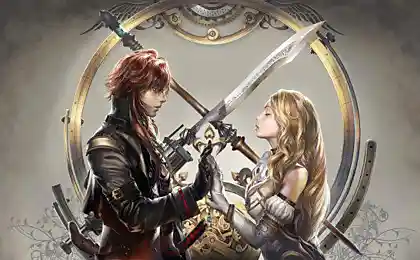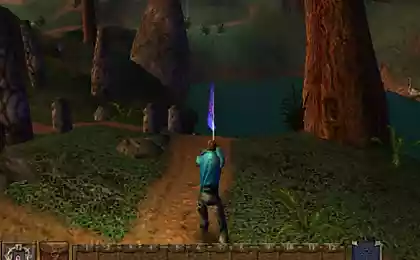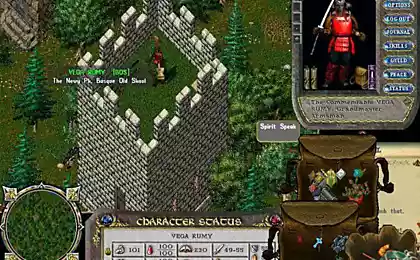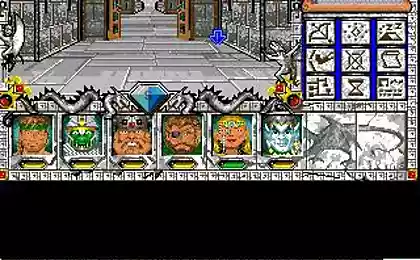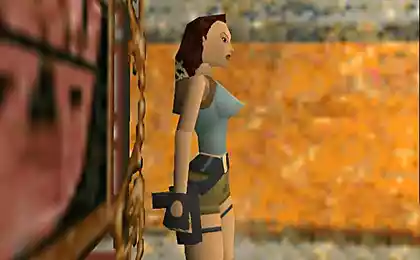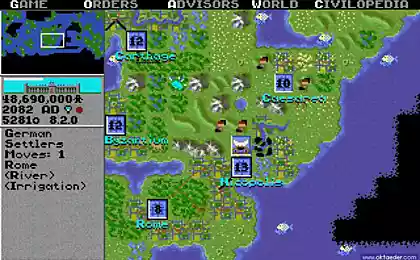1076
Rpg-remember how it all began
Continuing the theme of real-time strategy
Computer role-playing game (Eng. Computer Role-Playing Game (CRPG)) - a computer game based on the gameplay elements of traditional role-playing board games. Instead of the full name of the term is often used English abbreviation CRPG
CRPG gameplay elements found in real-time strategy, first person shooters, third-person shooter, but they are elements of other genres prevail over the role-playing.
In addition, these games are often borrow widespread desktop role-playing the story of a group of heroes who went in search of something.
A characteristic feature of many CRPG - strengthening the capacity of game characters by improving their numerical parameters, finding items and abilities, commonly referred to as "pumping." A player can usually choose the direction in which to develop their wards. Often CRPG «pumping" characters substitute their personality and the story of the game, so the role communities CRPG not always recognized RPGs
Akalabeth: World of Doom - the ancestor of the first game and the series Ultima (with index 0), and the first game of the fourth generation of computers. Akalabeth produced as a standalone game, and your serial number in the Ultima series has received only a few years, when came a few games under the name Ultima. Akalabeth recognized as one of the earliest known examples of a computer role-playing game (although the project was originally an amateur)
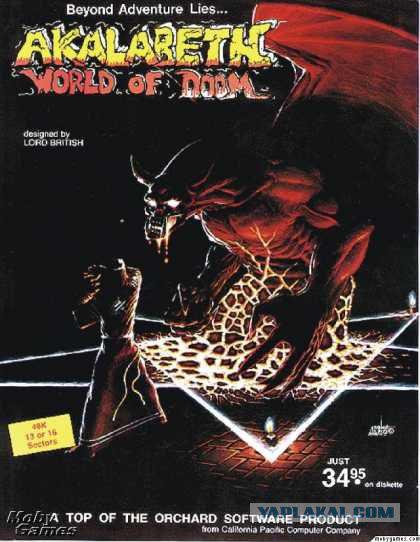
The developer of the game is Richard Garriott, who wrote it as a teenager, working in parallel with us ComputerLand. The game was written in BASIC for the computer Apple II. The first copies of the game sold in the same store personally Richard bags Ziplog. Later Richard contracted and the game was released by California Pacific Computer Company in general availability, thus becoming the first publisher of the series Ultima.
Initially, the game had a completely text-based interface, and all communication was done through dialogue. When Richard came Apple II (thanks to a contract with the California Pacific Computer Company), he made a graphical version with the version number Akalabeth D & D28b. It became Akalabeth who later became world. The game has sold 30,000 copies
There is a remake for the Java ME-platform for mobile phones
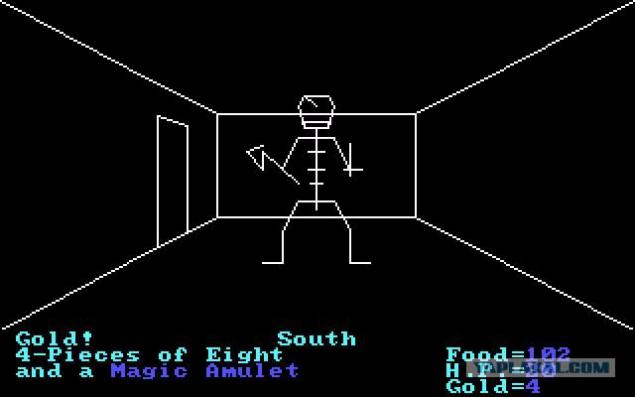
An important indicator testifying to the "role" the essence of the game, approximating it to the "real" role-playing games, is to comply with the so-called principle of the three "U", "kill, steal, and to persuade»
Sometimes you can find mention of the principle of the three "C", "force, stealth, a word." Here we are talking about the same methods, but more fully reflect all possible situations in the game
Ultima - a series of computer games and fantastic alternate universe of the same name, created by Richard «Lord British» Garriott. The first game - Ultima I: The First Age of Darkness / 1980. The game also has three of the trilogy there Ultima online. Four of the games were not released
* Arthurian Legends (canceled in 1993)
* Ultima VIII: The Lost Vale (addition, abolished in 1994)
* Ultima Worlds Online: Origin (Ultima Online 2, canceled in 2001)
* Ultima X: Odyssey (canceled in 2004)
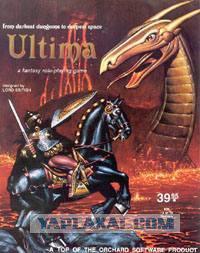
Console games from the Ultima series have been extremely popular in Japan, along with manga brand, products and merchandising (action figures, T-shirts, card games, and so on. D.)
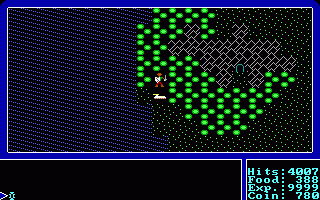
Wizardry - a series of computer role-playing game developed by Sir-Tech Software, and especially popular in the 80s. Originally created for the Apple II, it was later ported to other platforms. The last game in the series, Wizardry 8, available only for Windows. Games are considered a cult series in the history of CRPG.
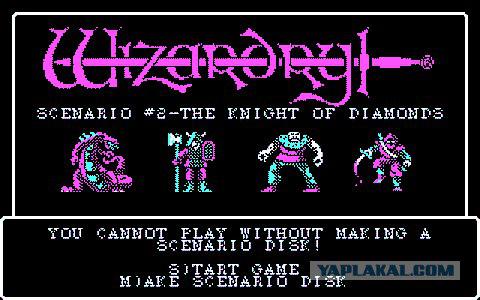
The first part of the series Wizardry was founded in 1981 by Andrew Greenberg and Robert Woodhead during their studies at Cornell University and published by Sir-Tech Software. The game stands out above all is fully three-dimensional graphics dungeons and made an impression on his players role-playing system. Emphasis was placed on the system of fighting in the first person. She gave only a minimal review, but in those days was considered a big step forward compared to the full text games. Initially, the game was created for the Apple II, but was soon as its continuation, ported to common while computer systems (without significant changes) and console (as opposed to a computer console versions differed markedly improved graphics). The second and third parts were continuations of the first with the new script, but with little or no technical improvements.
Beginning with the fourth part, the release of games led by David Bradley.
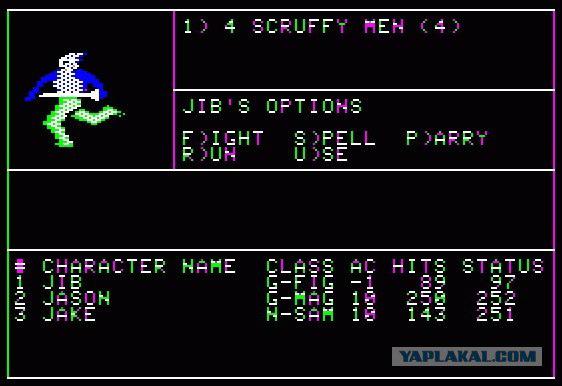
In the fourth part, Return of Werdna, seriously changed the concept of the series. For the first time in the history of role-playing games the players were able to win back the evil characters. There is also the first time there is the principle that the actions of the player depends on the ending of the game, which later became a key principle of the series. This part is the most sophisticated ever built role-playing game.
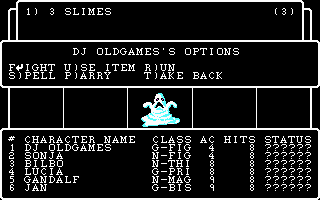
In addition to the main series, over time, numerous by-products (mainly on console) from the quest to completely new series, mainly produced in Japan. Wizardry series had a great influence on the series The Bard's Tale and Might and Magic. Might and Magic: The Secret Of The Inner Sanctum (1987) -first game series
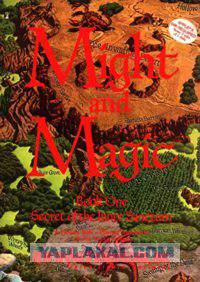
Might and Magic (Might & Magic, MM) - a series of computer role-playing games from the company New World Computing, initiated by John Van Kenegem (Jon Van Caneghem), and in the development of which is already in the composition he created New World Computing, he took an active participation. In addition, it is the general name of a universe in which there is an action game of this series, Heroes of Might and Magic (except HoMM V) as well as the game Crusaders of Might and Magic.
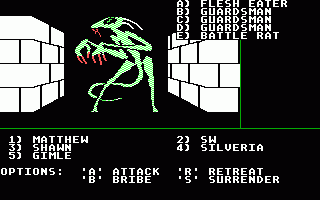
Another screenshot from the game
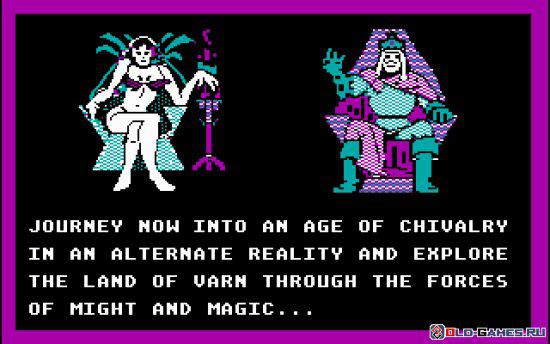
Wasteland - it's post-apocalyptic role-playing game. It was developed in 1986 by Alan Pavlish (Alan Pavlish), Michael Stokpolom (Michael A. Stackpole) and Andre Ken (Ken St. Andre) to Interplay Entertainment. Released by Electronic Arts
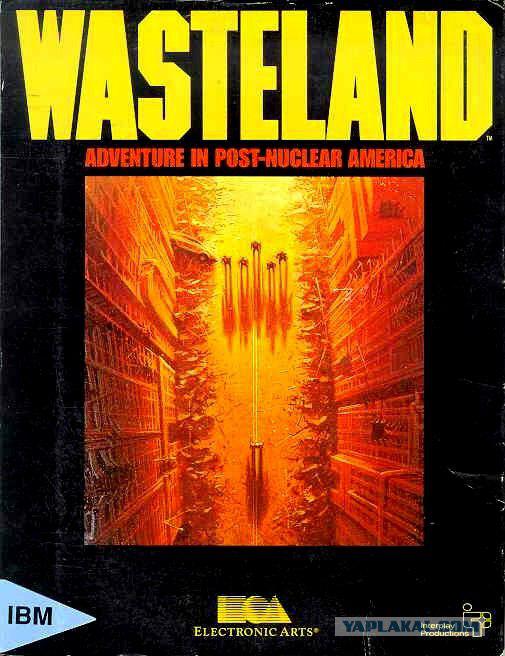
The game takes place in the middle of the XXI century, after a total nuclear war between the US and the USSR. Vast areas of the earth turned into a wasteland (Eng. Wastelands). Player squad headed desert rangers (Eng. Desert Rangers), who are descendants of the soldiers of the engineering troops of Nevada Holocaust survivors. This detachment assigned to investigate a series of different accidents that occurred in the deserts of the US West Coast. Exploring the post-apocalyptic world, the player will meet isolated human settlements, including dilapidated Las Vegas. At first, the detachment consists of four people who may later be increased to seven.
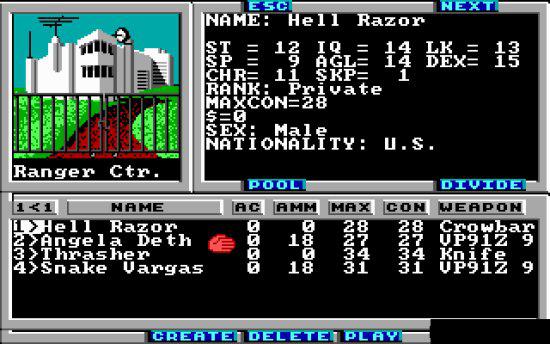
Wasteland was a successful game, included in the set list of the best games. Journal of Computer Gaming World awarded the game award "Best Role Playing Game of the Year", and after ten years have game ninth in the list of games of all time.
The game became the progenitor of a series of post-apocalyptic games, formalized in a separate genre. The developer, Interplay, called the spiritual ancestor of Wasteland game series Fallout, where there are separate elements and references to the Wasteland.
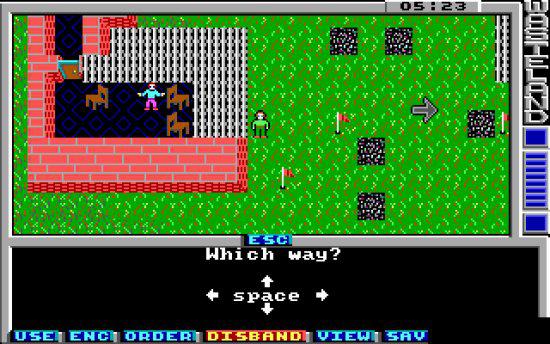
In 2003, InXile Entertainment (Wasteland headed by producer Brian Fargo) acquired the rights to Wasteland at EA. Brian himself has mentioned that he was going to release a continuation Wasteland
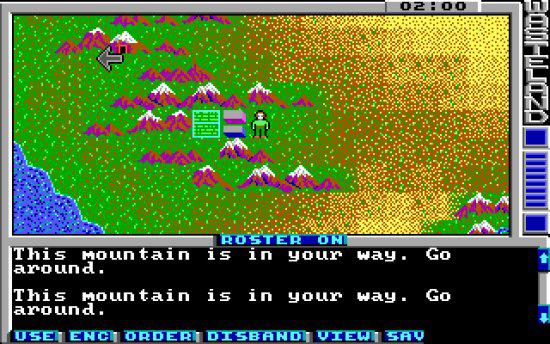
Diablo (from the Spanish. Diablo - Devil, Russian. Diablo [1]) - cult computer game hack and slash, developed and published by Blizzard November 30, 1996
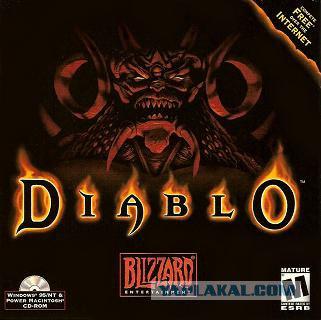
The company also Sierra Entertainment has released the game-supplement called Diablo: Hellfire. Interesting facts
* Diablo Originally conceived as a turn-based, strictly single-player RPG based on the image of X-COM. The idea to switch to real-time came from one of the employees of Blizzard. In reworking the code took only three hours [2]
* A few years ago were very popular rumors about the Cow level in the game Diablo. It was believed that if the city come to a cow and start shёlkat on it, then after some time open a portal to another world where there will be very strong, and the weapons will fall out of them with fantastic options! These tales filled online so that Blizzard began an active campaign against their spread. Eventually, the game was created Starcraft cheat, giving all to understand that the level of the cows do not have: There is no cow level. With this cheat you immediately win the mission. In the course of the game Diablo: Hellfire still cow level was added. But in Diablo II this level there, and all of its inhabitants - a cow.
* At the entrance to the 16th level plays a mystical sound. If you play it backwards, you will hear the phrase «Eat your vegetables and brush after every meal.» (Eat vegetables and after each meal brushing your teeth). This is - a fun reference to the widespread rumors that satanic messages recorded in this way and added to the music, perceived unconsciously and lead the youth to corruption, violence and drugs.
* In the background picture of the program installer has steganographic message is between the horns of a demon and stating «Natalie Portman Rocks». This message is not a demo version of the game.
* Rising Sun Tavern name matches the name of the pub, where did the idea for the establishment of FC "Chelsea". Many specialized publications Diablo was declared the best game of 1996
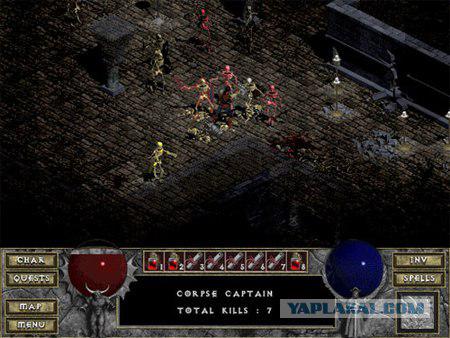
Fallout (Eng. Fallout or consequences), the Renaissance - the cult role-playing video game that takes place in the world, is slowly emerging from a nuclear war. It developed and released in 1997 by Interplay Entertainment. One of the most famous works of the post-apocalyptic genre. Officially, localized and published in Russia February 15, 2008 the company "1C"; earlier in the Russian market were produced counterfeit versions of the game, translated by «Fargus", "7 Wolf" and "Left Corporation" (the exact release date is unknown).
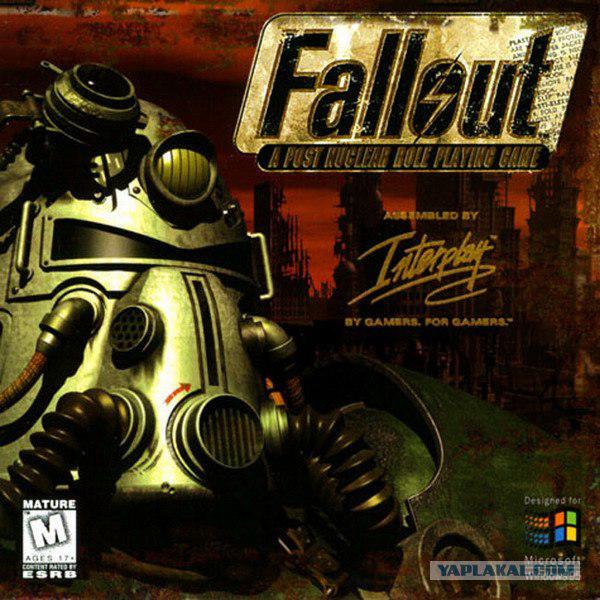
Interesting facts
* Prior to 1996, over the «Fallout» actually worked one man - Tim Kane (Tim Cain).
* In «Fallout» contains the text, which would be enough for about 1700 A4 pages, typed letters 12. And 700 pages of text - names.
* The phrase «War. War never changes », which became a symbol of a series of« Fallout », says the actor Ron Perlman.
* In the introductory clip «Fallout» song sounds «Maybe» group «The Ink Spots». It was originally planned to use a song «I Do not Want to Set the World on Fire» (which became the opening song in Fallout 3) of the same «The Ink Spots», but because of copyright issues had to give it up. The song «A Kiss to Build a Dream On» in «Fallout 2" belongs to Louis Armstrong.
Avelon Chris (Chris Avellone) (one of the leading developers) in correspondence with the fans is so carried away by an explanation of the facts of the world and the addition of Fallout, he created the so-called Fallout Bible. There are ten parts "book" (0 to 9, with a zero came later, and the first is a collection of parts 1, 2, 3). In fact, it is something more than just the FAQ.
* Initially, the «Fallout» planned to use role-playing system GURPS But when the company Steve Jackson, creator of GURPS, see the introduction to the game, where the American soldiers in Power Armor (Power Armor) kills Canadian prisoner, they rebelled, high levels of violence, and to terminate the contract.
* The demo version contains 62 pictures Fallout Vault Boy'ev not included in the game.
* Happy Birthday Fallout consider June 15, 1997, at which time the game was sent to press. Birthday Fallout 2 - October 31, 1998.
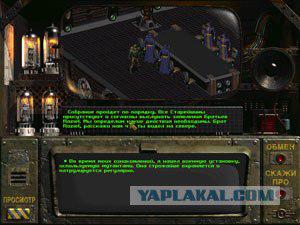
Fallout has been recognized numerous editions of cult computer game. In 2007, 10 years after the release of the game, the site IGN have the Fallout top 25 PC-games of all time, awarding him the fifth place
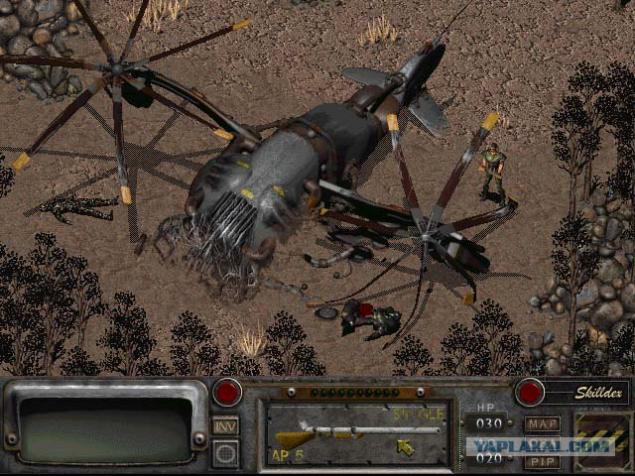
Baldur's Gate - the cult role-playing video game that takes place in a fantasy world of Forgotten Realms (in the northern part of the continent faerûn) developed by BioWare and published by Interplay in 1998. This is the first game in the series Baldur's Gate. The game had been additions Baldur's Gate: Tales of the Sword Coast (1999) and sequels Baldur's Gate II: Shadows of Amn (2000), and Baldur's Gate II: Throne of Bhaal. They also released a few games in the series for PS2 (in their role-playing component is greatly reduced). There were a lot of rumors about the development of Baldur's Gate III, but Bioware has officially stated that any work in this direction is carried out and planned.
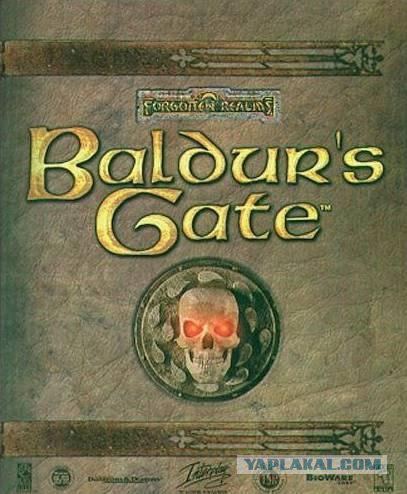
The game's plot is closely related to the book trilogy "Avatar" in which the events took place, known as the Time of Troubles
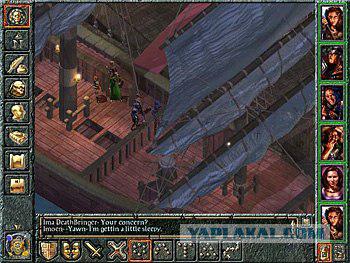
The game was developed on the basis of the rules of licensed tabletop role-playing game Advanced Dungeons & Dragons, with some elements of the system have been modified in view of the fact that the game is turn-based. Each character is in constant motion, with a function-driven pause, during which you can give orders to the characters, and then by removing the game from pause to watch their performance. The game is divided into seven chapters, each of which represents a certain logic of the plot. Perhaps the study of free map of the world, but there are some places that do not open until the player to be held to any point in the game. The player starts the game with one poorly equipped characters, but in the game he can assemble a team of up to 6 members, each with access to the experience improves their abilities can also be improved (find, remove from dead enemies, steal, buy, receive a reward) equipment characters.
Control of the game takes place in real time, using the tactical pause.
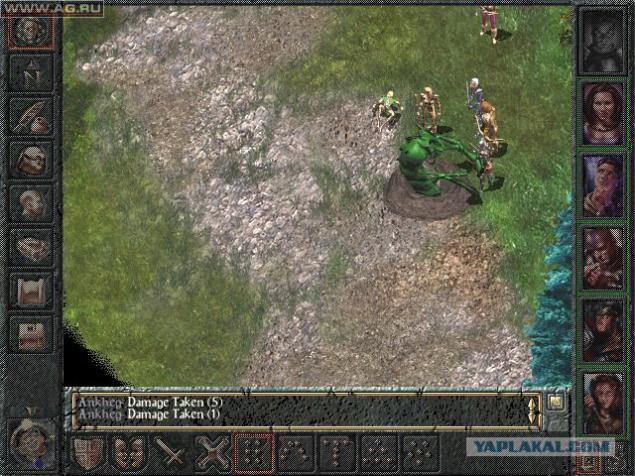
Planescape: Torment - the cult role-playing video game studio Black Isle published by Interplay in 1999. The game takes place in one of the worlds most unusual tabletop role-playing game Advanced Dungeons & Dragons - Planescape. At the head of the development team of the Black Isle Studios was Chris Avellone.
The emphasis on communication with the characters, storyline and atmosphere, not the battles distinguished «Planescape: Torment» from most role-playing games. Despite the relatively small sales (400 thousand. Copies, according to the developers), the game has become a cult. «Planescape: Torment» covers topics redemption, guilt, perception of reality, the significance and the importance of self-understanding.
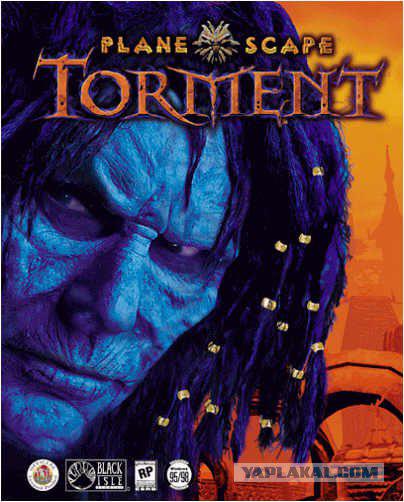
Unusual game world highlights «Planescape: Torment» among other computer role-playing games, which takes place in the familiar fantasy worlds. The game tries to avoid patterns of habitual players familiar with other games of this genre. Thus, in Torment «standard" fantasy equipment - armor, swords, shields - replaced earrings, tattoos, the ability to "replace" his eyes or fight their own off and mummified hand. It is not necessary to save the world from another villain, and stand up for "the weak and offended" only at their own request. Throughout the game you need to win the fight just four creatures, which, however, does not stop to take the path of destruction and killing anything that will get in the way of a player ... as long as the patience of Lady overflows.
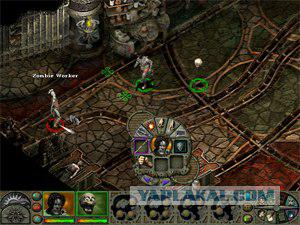
* «Planescape: Torment» remarkable amount of text in the game dialogues. According to the authors, there is almost 1 million words. It is believed that the game could slovoobilnost discourage some potential players understand what the gameplay is often reduced to the solution of tasks through a selection of replicas in dialogues instead of battles. The game has a total of four mandatory fight, the rest you can avoid talking or tricks.
* Based on the game book was published. It was written before the end of the scenario of the game, so the story lines do not coincide. Fans of the game largely reacted negatively to the book.
* For St. Patrick's Day and Easter 2000, the developers have released two funny patch one turned Anna into a leprechaun, the other - in easter egg Morte.
* The box «Planescape: Torment» depicts make up the face of one of the authors of the game, Guido Henkel.
* The game is based on the role-playing system, AD & D, with some modifications. For example, the main character in each level receives one extra point statistics that allows you to raise some features to the "inhuman" by the standards of this role-playing system variables (ie more than 18).
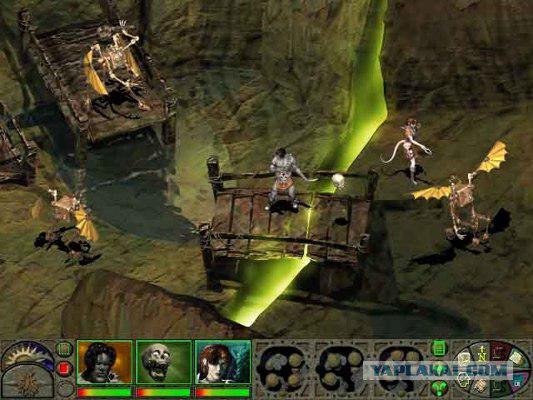
Gothic, in the Russian localization of "Gothic" - cult computer game, the first part of a series CRPG «Gothic". The game was released in early 2001, but the official Russian version was released only 25 October 2002.
Localization carried Snowball Interactive, the publisher has acted as 1C.
After a while, the game re-released Russobit-M called "Gothic - Collector's Edition." The game was released in a cost-effective and gift packages on two CDs. In this edition, in addition to the game itself, on the disks placed fan-made mod "Dikkurik" (available as a free download from the Internet), and some things that are not licensed in the last edition (for example, concert band In Extremo in the old camp at the beginning of the second chapter ) have been removed or censored. But the quality of this location, in popular belief, losing an embodiment of 1C / Snowball, moreover, this release contains more errors.
In the translation of two locations a lot of differences. The article used the translations from Snowball.
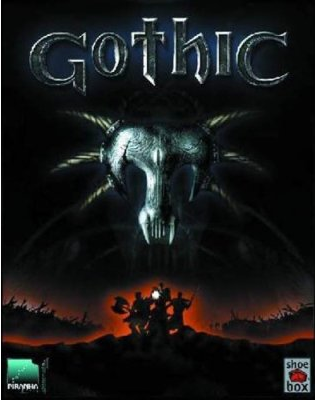
* Difficult, but nevertheless, almost linear plot.
* Non-standard and commonly recognized inconvenient, control character, a third-person.
Source:
Computer role-playing game (Eng. Computer Role-Playing Game (CRPG)) - a computer game based on the gameplay elements of traditional role-playing board games. Instead of the full name of the term is often used English abbreviation CRPG
CRPG gameplay elements found in real-time strategy, first person shooters, third-person shooter, but they are elements of other genres prevail over the role-playing.
In addition, these games are often borrow widespread desktop role-playing the story of a group of heroes who went in search of something.
A characteristic feature of many CRPG - strengthening the capacity of game characters by improving their numerical parameters, finding items and abilities, commonly referred to as "pumping." A player can usually choose the direction in which to develop their wards. Often CRPG «pumping" characters substitute their personality and the story of the game, so the role communities CRPG not always recognized RPGs
Akalabeth: World of Doom - the ancestor of the first game and the series Ultima (with index 0), and the first game of the fourth generation of computers. Akalabeth produced as a standalone game, and your serial number in the Ultima series has received only a few years, when came a few games under the name Ultima. Akalabeth recognized as one of the earliest known examples of a computer role-playing game (although the project was originally an amateur)

The developer of the game is Richard Garriott, who wrote it as a teenager, working in parallel with us ComputerLand. The game was written in BASIC for the computer Apple II. The first copies of the game sold in the same store personally Richard bags Ziplog. Later Richard contracted and the game was released by California Pacific Computer Company in general availability, thus becoming the first publisher of the series Ultima.
Initially, the game had a completely text-based interface, and all communication was done through dialogue. When Richard came Apple II (thanks to a contract with the California Pacific Computer Company), he made a graphical version with the version number Akalabeth D & D28b. It became Akalabeth who later became world. The game has sold 30,000 copies
There is a remake for the Java ME-platform for mobile phones

An important indicator testifying to the "role" the essence of the game, approximating it to the "real" role-playing games, is to comply with the so-called principle of the three "U", "kill, steal, and to persuade»
Sometimes you can find mention of the principle of the three "C", "force, stealth, a word." Here we are talking about the same methods, but more fully reflect all possible situations in the game
Ultima - a series of computer games and fantastic alternate universe of the same name, created by Richard «Lord British» Garriott. The first game - Ultima I: The First Age of Darkness / 1980. The game also has three of the trilogy there Ultima online. Four of the games were not released
* Arthurian Legends (canceled in 1993)
* Ultima VIII: The Lost Vale (addition, abolished in 1994)
* Ultima Worlds Online: Origin (Ultima Online 2, canceled in 2001)
* Ultima X: Odyssey (canceled in 2004)

Console games from the Ultima series have been extremely popular in Japan, along with manga brand, products and merchandising (action figures, T-shirts, card games, and so on. D.)

Wizardry - a series of computer role-playing game developed by Sir-Tech Software, and especially popular in the 80s. Originally created for the Apple II, it was later ported to other platforms. The last game in the series, Wizardry 8, available only for Windows. Games are considered a cult series in the history of CRPG.

The first part of the series Wizardry was founded in 1981 by Andrew Greenberg and Robert Woodhead during their studies at Cornell University and published by Sir-Tech Software. The game stands out above all is fully three-dimensional graphics dungeons and made an impression on his players role-playing system. Emphasis was placed on the system of fighting in the first person. She gave only a minimal review, but in those days was considered a big step forward compared to the full text games. Initially, the game was created for the Apple II, but was soon as its continuation, ported to common while computer systems (without significant changes) and console (as opposed to a computer console versions differed markedly improved graphics). The second and third parts were continuations of the first with the new script, but with little or no technical improvements.
Beginning with the fourth part, the release of games led by David Bradley.

In the fourth part, Return of Werdna, seriously changed the concept of the series. For the first time in the history of role-playing games the players were able to win back the evil characters. There is also the first time there is the principle that the actions of the player depends on the ending of the game, which later became a key principle of the series. This part is the most sophisticated ever built role-playing game.

In addition to the main series, over time, numerous by-products (mainly on console) from the quest to completely new series, mainly produced in Japan. Wizardry series had a great influence on the series The Bard's Tale and Might and Magic. Might and Magic: The Secret Of The Inner Sanctum (1987) -first game series

Might and Magic (Might & Magic, MM) - a series of computer role-playing games from the company New World Computing, initiated by John Van Kenegem (Jon Van Caneghem), and in the development of which is already in the composition he created New World Computing, he took an active participation. In addition, it is the general name of a universe in which there is an action game of this series, Heroes of Might and Magic (except HoMM V) as well as the game Crusaders of Might and Magic.

Another screenshot from the game

Wasteland - it's post-apocalyptic role-playing game. It was developed in 1986 by Alan Pavlish (Alan Pavlish), Michael Stokpolom (Michael A. Stackpole) and Andre Ken (Ken St. Andre) to Interplay Entertainment. Released by Electronic Arts

The game takes place in the middle of the XXI century, after a total nuclear war between the US and the USSR. Vast areas of the earth turned into a wasteland (Eng. Wastelands). Player squad headed desert rangers (Eng. Desert Rangers), who are descendants of the soldiers of the engineering troops of Nevada Holocaust survivors. This detachment assigned to investigate a series of different accidents that occurred in the deserts of the US West Coast. Exploring the post-apocalyptic world, the player will meet isolated human settlements, including dilapidated Las Vegas. At first, the detachment consists of four people who may later be increased to seven.

Wasteland was a successful game, included in the set list of the best games. Journal of Computer Gaming World awarded the game award "Best Role Playing Game of the Year", and after ten years have game ninth in the list of games of all time.
The game became the progenitor of a series of post-apocalyptic games, formalized in a separate genre. The developer, Interplay, called the spiritual ancestor of Wasteland game series Fallout, where there are separate elements and references to the Wasteland.

In 2003, InXile Entertainment (Wasteland headed by producer Brian Fargo) acquired the rights to Wasteland at EA. Brian himself has mentioned that he was going to release a continuation Wasteland

Diablo (from the Spanish. Diablo - Devil, Russian. Diablo [1]) - cult computer game hack and slash, developed and published by Blizzard November 30, 1996

The company also Sierra Entertainment has released the game-supplement called Diablo: Hellfire. Interesting facts
* Diablo Originally conceived as a turn-based, strictly single-player RPG based on the image of X-COM. The idea to switch to real-time came from one of the employees of Blizzard. In reworking the code took only three hours [2]
* A few years ago were very popular rumors about the Cow level in the game Diablo. It was believed that if the city come to a cow and start shёlkat on it, then after some time open a portal to another world where there will be very strong, and the weapons will fall out of them with fantastic options! These tales filled online so that Blizzard began an active campaign against their spread. Eventually, the game was created Starcraft cheat, giving all to understand that the level of the cows do not have: There is no cow level. With this cheat you immediately win the mission. In the course of the game Diablo: Hellfire still cow level was added. But in Diablo II this level there, and all of its inhabitants - a cow.
* At the entrance to the 16th level plays a mystical sound. If you play it backwards, you will hear the phrase «Eat your vegetables and brush after every meal.» (Eat vegetables and after each meal brushing your teeth). This is - a fun reference to the widespread rumors that satanic messages recorded in this way and added to the music, perceived unconsciously and lead the youth to corruption, violence and drugs.
* In the background picture of the program installer has steganographic message is between the horns of a demon and stating «Natalie Portman Rocks». This message is not a demo version of the game.
* Rising Sun Tavern name matches the name of the pub, where did the idea for the establishment of FC "Chelsea". Many specialized publications Diablo was declared the best game of 1996

Fallout (Eng. Fallout or consequences), the Renaissance - the cult role-playing video game that takes place in the world, is slowly emerging from a nuclear war. It developed and released in 1997 by Interplay Entertainment. One of the most famous works of the post-apocalyptic genre. Officially, localized and published in Russia February 15, 2008 the company "1C"; earlier in the Russian market were produced counterfeit versions of the game, translated by «Fargus", "7 Wolf" and "Left Corporation" (the exact release date is unknown).

Interesting facts
* Prior to 1996, over the «Fallout» actually worked one man - Tim Kane (Tim Cain).
* In «Fallout» contains the text, which would be enough for about 1700 A4 pages, typed letters 12. And 700 pages of text - names.
* The phrase «War. War never changes », which became a symbol of a series of« Fallout », says the actor Ron Perlman.
* In the introductory clip «Fallout» song sounds «Maybe» group «The Ink Spots». It was originally planned to use a song «I Do not Want to Set the World on Fire» (which became the opening song in Fallout 3) of the same «The Ink Spots», but because of copyright issues had to give it up. The song «A Kiss to Build a Dream On» in «Fallout 2" belongs to Louis Armstrong.
Avelon Chris (Chris Avellone) (one of the leading developers) in correspondence with the fans is so carried away by an explanation of the facts of the world and the addition of Fallout, he created the so-called Fallout Bible. There are ten parts "book" (0 to 9, with a zero came later, and the first is a collection of parts 1, 2, 3). In fact, it is something more than just the FAQ.
* Initially, the «Fallout» planned to use role-playing system GURPS But when the company Steve Jackson, creator of GURPS, see the introduction to the game, where the American soldiers in Power Armor (Power Armor) kills Canadian prisoner, they rebelled, high levels of violence, and to terminate the contract.
* The demo version contains 62 pictures Fallout Vault Boy'ev not included in the game.
* Happy Birthday Fallout consider June 15, 1997, at which time the game was sent to press. Birthday Fallout 2 - October 31, 1998.

Fallout has been recognized numerous editions of cult computer game. In 2007, 10 years after the release of the game, the site IGN have the Fallout top 25 PC-games of all time, awarding him the fifth place

Baldur's Gate - the cult role-playing video game that takes place in a fantasy world of Forgotten Realms (in the northern part of the continent faerûn) developed by BioWare and published by Interplay in 1998. This is the first game in the series Baldur's Gate. The game had been additions Baldur's Gate: Tales of the Sword Coast (1999) and sequels Baldur's Gate II: Shadows of Amn (2000), and Baldur's Gate II: Throne of Bhaal. They also released a few games in the series for PS2 (in their role-playing component is greatly reduced). There were a lot of rumors about the development of Baldur's Gate III, but Bioware has officially stated that any work in this direction is carried out and planned.

The game's plot is closely related to the book trilogy "Avatar" in which the events took place, known as the Time of Troubles

The game was developed on the basis of the rules of licensed tabletop role-playing game Advanced Dungeons & Dragons, with some elements of the system have been modified in view of the fact that the game is turn-based. Each character is in constant motion, with a function-driven pause, during which you can give orders to the characters, and then by removing the game from pause to watch their performance. The game is divided into seven chapters, each of which represents a certain logic of the plot. Perhaps the study of free map of the world, but there are some places that do not open until the player to be held to any point in the game. The player starts the game with one poorly equipped characters, but in the game he can assemble a team of up to 6 members, each with access to the experience improves their abilities can also be improved (find, remove from dead enemies, steal, buy, receive a reward) equipment characters.
Control of the game takes place in real time, using the tactical pause.

Planescape: Torment - the cult role-playing video game studio Black Isle published by Interplay in 1999. The game takes place in one of the worlds most unusual tabletop role-playing game Advanced Dungeons & Dragons - Planescape. At the head of the development team of the Black Isle Studios was Chris Avellone.
The emphasis on communication with the characters, storyline and atmosphere, not the battles distinguished «Planescape: Torment» from most role-playing games. Despite the relatively small sales (400 thousand. Copies, according to the developers), the game has become a cult. «Planescape: Torment» covers topics redemption, guilt, perception of reality, the significance and the importance of self-understanding.

Unusual game world highlights «Planescape: Torment» among other computer role-playing games, which takes place in the familiar fantasy worlds. The game tries to avoid patterns of habitual players familiar with other games of this genre. Thus, in Torment «standard" fantasy equipment - armor, swords, shields - replaced earrings, tattoos, the ability to "replace" his eyes or fight their own off and mummified hand. It is not necessary to save the world from another villain, and stand up for "the weak and offended" only at their own request. Throughout the game you need to win the fight just four creatures, which, however, does not stop to take the path of destruction and killing anything that will get in the way of a player ... as long as the patience of Lady overflows.

* «Planescape: Torment» remarkable amount of text in the game dialogues. According to the authors, there is almost 1 million words. It is believed that the game could slovoobilnost discourage some potential players understand what the gameplay is often reduced to the solution of tasks through a selection of replicas in dialogues instead of battles. The game has a total of four mandatory fight, the rest you can avoid talking or tricks.
* Based on the game book was published. It was written before the end of the scenario of the game, so the story lines do not coincide. Fans of the game largely reacted negatively to the book.
* For St. Patrick's Day and Easter 2000, the developers have released two funny patch one turned Anna into a leprechaun, the other - in easter egg Morte.
* The box «Planescape: Torment» depicts make up the face of one of the authors of the game, Guido Henkel.
* The game is based on the role-playing system, AD & D, with some modifications. For example, the main character in each level receives one extra point statistics that allows you to raise some features to the "inhuman" by the standards of this role-playing system variables (ie more than 18).

Gothic, in the Russian localization of "Gothic" - cult computer game, the first part of a series CRPG «Gothic". The game was released in early 2001, but the official Russian version was released only 25 October 2002.
Localization carried Snowball Interactive, the publisher has acted as 1C.
After a while, the game re-released Russobit-M called "Gothic - Collector's Edition." The game was released in a cost-effective and gift packages on two CDs. In this edition, in addition to the game itself, on the disks placed fan-made mod "Dikkurik" (available as a free download from the Internet), and some things that are not licensed in the last edition (for example, concert band In Extremo in the old camp at the beginning of the second chapter ) have been removed or censored. But the quality of this location, in popular belief, losing an embodiment of 1C / Snowball, moreover, this release contains more errors.
In the translation of two locations a lot of differences. The article used the translations from Snowball.

* Difficult, but nevertheless, almost linear plot.
* Non-standard and commonly recognized inconvenient, control character, a third-person.
Source:

